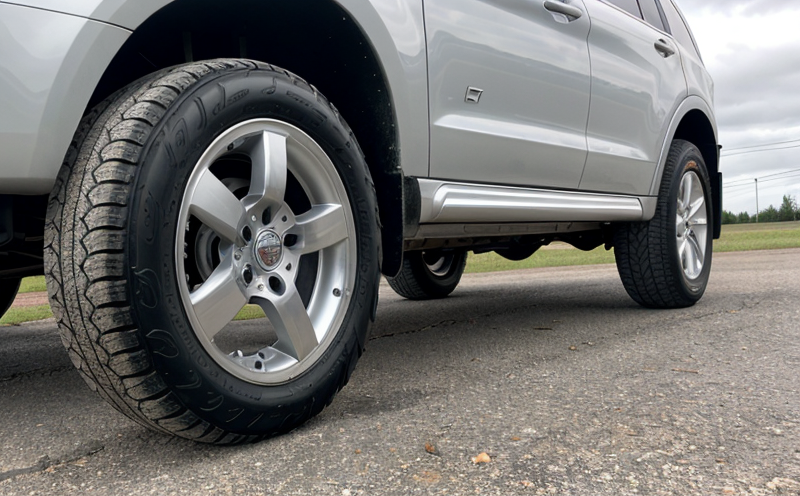ASTM E384 Microhardness Testing of Wheel Heat Affected Zones
The ASTM E384 microhardness testing method is a critical tool in ensuring the integrity and performance of railway wheel components. This service focuses on evaluating the heat-affected zones (HAZ) within wheels, which are areas affected by welding or other thermal processes. The HAZ region can significantly influence the mechanical properties of the material, making it essential to characterize these regions through precise microhardness testing.
The ASTM E384 method uses a Vickers indenter to measure hardness values across the HAZ. This approach allows for the quantification of changes in hardness due to thermal processing, which can indicate potential areas of weakness or variability. The test is particularly relevant for ensuring compliance with international standards such as ISO 15376 and ASTM E428.
During specimen preparation, a cross-section of the wheel HAZ is typically ground and polished to reveal the microstructure under examination. This process ensures that only the heat-affected layers are tested, providing accurate data on the hardness variations within these zones. The testing equipment used in this service includes advanced microhardness testers capable of achieving high precision down to 0.1 HV (Hardness Values). Each test is conducted at a specified load and dwell time, ensuring consistency with ASTM E384 specifications.
The results from ASTM E384 testing are crucial for quality assurance in railway wheel manufacturing. By identifying variations in hardness within the HAZ, manufacturers can implement targeted improvements to their processes, leading to more reliable and safer wheels. Compliance with these standards is not only important for meeting regulatory requirements but also for maintaining a high level of trust among customers.
Compliance with ASTM E384 ensures that railway wheel components meet stringent quality control criteria, reducing the risk of failures due to material inconsistencies. This service supports the overall goal of enhancing safety and reliability in transportation systems by providing detailed insights into the mechanical properties of wheel materials post-thermal processing.
Eurolab Advantages
At Eurolab, our commitment to excellence is reflected in every service we provide. Our expertise in ASTM E384 microhardness testing of wheel HAZ ensures that customers receive accurate and reliable results, contributing to the safety and reliability of railway transportation systems.
- In-depth knowledge: Our team comprises seasoned professionals with extensive experience in materials science and quality assurance. This expertise is crucial for interpreting test results accurately.
- State-of-the-art equipment: We utilize cutting-edge microhardness testers that meet the highest industry standards, ensuring precise measurements down to 0.1 HV.
- Comprehensive reporting: Our detailed reports provide not only hardness values but also insights into material behavior and potential areas for improvement.
- Timely delivery: We prioritize customer satisfaction by delivering results within specified timelines, ensuring that decision-makers have the information they need promptly.
By choosing Eurolab for ASTM E384 microhardness testing of wheel HAZ, customers can trust in our commitment to providing high-quality services. Our expertise and precision contribute significantly to maintaining the integrity of railway components, ultimately enhancing safety and reliability.
Customer Impact and Satisfaction
The impact of ASTM E384 microhardness testing on customer satisfaction is profound. By ensuring that all wheel HAZs meet stringent quality standards, we contribute to the overall safety and reliability of railway systems. This service not only meets regulatory requirements but also exceeds expectations by providing detailed insights into material properties.
Our customers appreciate the comprehensive nature of our reports, which offer more than just numerical data. They provide valuable recommendations for process improvements that can enhance product quality further. This level of detail ensures that our clients are well-informed and confident in their decisions regarding railway component specifications.
The precision and accuracy of Eurolab’s testing services have been recognized by numerous industry leaders, leading to long-term partnerships and repeat business. Our commitment to excellence has earned us a reputation for reliability and trustworthiness within the sector.
Customer satisfaction is our top priority, and we strive to exceed expectations with every service provided. By choosing Eurolab for ASTM E384 microhardness testing of wheel HAZs, customers can rest assured that they are investing in a reliable partner who shares their commitment to quality and safety.
Frequently Asked Questions
- Ensures compliance with international standards and regulations
- Provides detailed insights into material properties
- Supports quality assurance in manufacturing processes
- Reduces the risk of failures due to material inconsistencies





